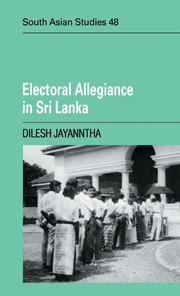Book contents
- Frontmatter
- Contents
- Acknowledgments
- List of abbreviations
- 1 Introduction
- 2 Bluville: the constituency and the patronage network of Doctor Ay (1947–1959)
- 3 Bluville: the patronage network of Korale-Mudaliyar Kit Foo and his son, Dee (1947–1959)
- 4 Bluville: the growth of the State (1956–1982)
- 5 Greenville: the patronage networks of the Mou/Nous and the Pou/Kous (1947–1959)
- 6 Greenville: the growth of the State (1956–1982)
- 7 Red Town: the urban setting (1947–1959)
- 8 Red Town: the growth of the State (1956–1982)
- 9 Communal minorities, political dissidents and the JVP
- 10 Conclusion
- Glossary of Sinhalese Terms
- References
- Index
- CAMBRIDGE SOUTH ASIAN STUDIES
5 - Greenville: the patronage networks of the Mou/Nous and the Pou/Kous (1947–1959)
Published online by Cambridge University Press: 11 September 2009
- Frontmatter
- Contents
- Acknowledgments
- List of abbreviations
- 1 Introduction
- 2 Bluville: the constituency and the patronage network of Doctor Ay (1947–1959)
- 3 Bluville: the patronage network of Korale-Mudaliyar Kit Foo and his son, Dee (1947–1959)
- 4 Bluville: the growth of the State (1956–1982)
- 5 Greenville: the patronage networks of the Mou/Nous and the Pou/Kous (1947–1959)
- 6 Greenville: the growth of the State (1956–1982)
- 7 Red Town: the urban setting (1947–1959)
- 8 Red Town: the growth of the State (1956–1982)
- 9 Communal minorities, political dissidents and the JVP
- 10 Conclusion
- Glossary of Sinhalese Terms
- References
- Index
- CAMBRIDGE SOUTH ASIAN STUDIES
Summary
Introduction
Greenville is a constituency with many similarities to Bluville: both constituencies are in the Low Country; both are largely rural; in both over nine-tenths of the population is Sinhala Buddhist; and both have a very similar history, geography and socio-economic and administrative structure. The major difference lies in the economic and social positions of the castes. In Greenville the Goigama community is economically and socially dominant at both the village and the electoral levels. By and large, all other castes bear a client-type relationship to it. There has to date been no caste like the Karave in Bluville to challenge this dominance, and the two major political factions have both been led by members of this community. We shall try to show that the support these leaders drew during this early period (1947–59) rested on the same bases as in Bluville: namely through ties of economic and social dependence (via the land, the Mudaliyar system and local government), rather than via any caste identity with the voters, who were overwhelmingly Goigama.
In 1946 the electorate covered an area of about 120 square miles and consisted of three constituent parts: first Groville Korale containing over half the electorate's population; secondly, a part of Kross Korale North accounting for another third or so, and finally sections of Yap Korale (East and West) with the remainder. In 1959 the electoral boundaries were redrawn to exclude Kross Korale North and include only a part of Gro ville Korale, and a reduced extent of Yap Korale (East and West).
- Type
- Chapter
- Information
- Electoral Allegiance in Sri Lanka , pp. 82 - 109Publisher: Cambridge University PressPrint publication year: 1992



